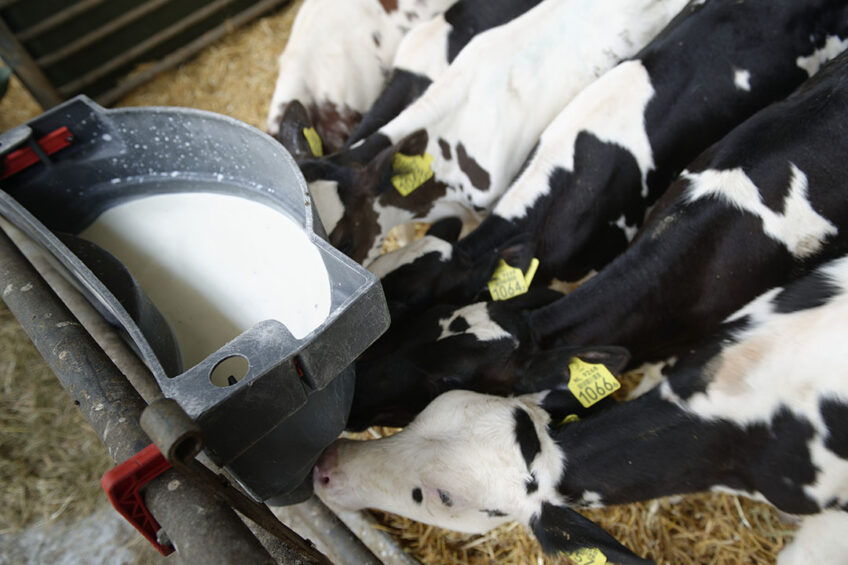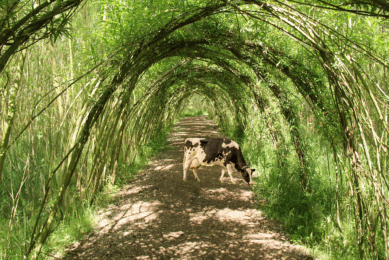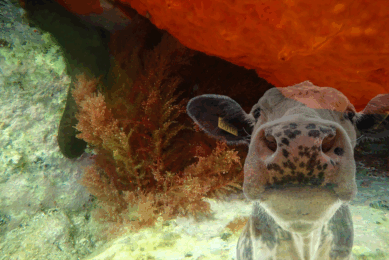Flavonoid baicalin improves the growth and health of pre-weaned calves

Supplementation of the flavonoid baicalin to pre-weaned calves improves blood antioxidant, anti-inflammatory, and immune functions while reducing the severity and occurrence of diarrhoea, a new study reviews.
Neonatal calf diarrhoea is one of the main causes of calf morbidity and mortality; it affects the growth and health of calves causing huge economic losses. A report from the USDA’s National Animal Health Monitoring System (NAHMS) shows that 33.8% of heifer calves experience morbidity events before weaning, and diarrhoea accounts for 53–63% of mortalities. Strategies that reduce diarrhoea help to improve the health and performance of pre-weaned calves, reducing the associated economic losses.
Baicalin is a bioactive flavonoid compound derived from the roots of the Scutellaria baicalensis with antibacterial, antioxidant, and anti-inflammatory activity. Baicalin contains flavonoids such as baicalin, baicalein, and wogonin, which are widely used to treat hepatitis, pneumonia, enteritis, dysentery, allergic reactions, colds, and respiratory infections in human clinical practice. In previous studies, the extracts of S. baicalensis have been shown to improve health and performance by alleviating inflammation, increasing antioxidant activity, and inhibiting the growth of harmful bacteria. The researchers of the current study determined the benefits of baicalin supplementation on the growth performance, immune capacity, and health of pre-weaned Holstein calves.
Baicalin supplementation
To investigate the effect of baicalin on the growth and health of pre-weaned calves, a total of 45 Holstein calves were assigned to 3 treatments of a milk replacer diet comprising baicalin at 0 mg/kg baicalin (Control group), 10 mg/kg, and 20 mg/kg baicalin per day. The calves remained in the trial from day 7 to day 56 of age.
Growth performance and health
In the present study, baicalin supplementation improved growth performance in pre-weaned calves (Table 1), observed through the improvement of health status. Baicalin decreased the days and occurrence of diarrhoea while reducing the diarrhoea medication days compared to the control calves throughout the trial.
A dose of 10 mg/kg baicalin was profoundly effective in improving weight gain and feed efficiency. The benefits of baicalin were attributed to the presence of flavonoids which, in other studies, have been shown to improve the growth performance and health of young ruminants by increasing the activity of protein and starch digestive enzymes such as amylase, protease, and lactase in the gut.
In the current study, besides the improvement of digestive enzymes, baicalin had a positive effect on growth hormones; the researchers found that 10 mg/kg baicalin significantly increases the serum concentrations of growth hormone and insulin-like growth factor 1.
Improvement in health has a positive effect on growth performance; in vitro studies show that baicalin has an inhibitory effect on various pathogens such as Pseudomonas aeruginosa, Helicobacter pylori, and E. coli. Similarly, a study published in the Journal of Agricultural and Food Chemistry observed that flavonoids could inhibit intestinal barrier damage caused by E. coli.
Antioxidant capacity
Researchers found that baicalin improves the antioxidant status of calves by increasing the concentration of antioxidant enzymes, superoxide dismutase, glutathione peroxidase, and catalase, with greater benefits observed on the 10 mg/kg dose. Superoxide dismutase and glutathione peroxidase eliminate superoxide and lipid hydroperoxide, reducing the damage caused by hydrogen peroxide in the body. Similarly, catalase removes hydrogen peroxide from the body by decomposing it into molecular oxygen and water. Malondialdehyde (MDA), a product of lipid oxidation, which reflects the degree of lipid peroxidation in the body and the degree of cell damage was significantly reduced by the supplementation of baicalin. The positive effect of baicalin on the antioxidant system was related to the presence of flavonoids that inhibit reactive oxygen species by inhibiting enzymes or chelating microelements involved in the production of free radicals. It was suggested baicalin could enhance the expression of antioxidant enzymes via the regulation of the Nrf2 pathway.
Anti-inflammatory capacity
Due to an immature system, calves are susceptible to infection with pathogens leading to diarrhoea; diarrhoea changes the intestinal environment as it increases the attachment of bacteria to the intestinal epithelium — resulting in colonisation. Subsequently, bacteria, such as gram-negative bacteria, multiply and release large amounts of lipopolysaccharides (LPS); the translocation of LPS into the bloodstream leads to systemic inflammation.
On the other hand, cytokines, which comprise proinflammatory factors and anti-inflammatory factors, regulate the development of acute and chronic inflammation. In the current study, supplementation of 10 mg/kg BW baicalin decreased serum pro-inflammatory cytokine levels and increased anti-inflammatory cytokine concentrations during the entire preweaning period. A study published in the Canadian Journal of Physiology and Pharmacology found that baicalin ameliorates lipopolysaccharide (LPS)-induced intestinal epithelial cell injury by inhibiting inflammatory cytokines and upregulating the transcription and expression of intercellular tight junctions.
Concentration of immunoglobulins
Studies show in the first 5 weeks of life that calves lack effective immunity to protect against infectious diseases; calves mainly depend on passively acquired maternal immunoglobulins, immune cells, and other substances from colostrum. In this study, serum immunoglobulin concentrations were consistent with concentrations of antioxidant indices and inflammatory cytokines. The 10 mg/kg baicalin supplementation increased serum immunoglobulin (IgA, IgG, IgM) concentrations compared to the control group (Table 1). The results indicated that the positive effects of baicalin on the immunity of calves were at an optimal level between 0 and 10 mg/kg. The effect of baicalin on immunoglobulins was associated with the alleviation of inflammatory reactions. Researchers concluded: “Supplementation of baicalin to better alleviate inflammatory reactions may partly explain that it can better increase the serum immunoglobulin concentration of calves at age 28 days. However, further research is needed to verify the underlying mechanisms of the effect of baicalin on immunity in calves.”
Conclusion
This study demonstrated that baicalin supplementation decreases the days and the occurrence of diarrhoea during the pre-weaning period of calves. It was remarked that although baicalin supplementation of 10 mg/kg BW per day has profound effects on blood antioxidant, anti-inflammatory, and immune functions, future studies are needed to explore the optimal dose, and its effect on nutrition digestion and gut health with or without diarrhoea conditions and the mechanisms involved.
This article is based on the original article by Fengming Hu, Yanliang Bi, Xueling Zheng, Meng Lu, Qiyu Diao, and Yan Tu. 2023. Effect of baicalin supplementation on the growth, health, antioxidant and anti-inflammatory capacity, and immune function of pre-weaned calves. Animal Feed Science and Technology, Vol 298: 115598.











